|
|
|
Sort Order |
|
|
|
Items / Page
|
|
|
|
|
|
|
| Srl | Item |
| 1 |
ID:
145643
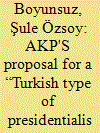

|
|
|
|
|
| Summary/Abstract |
President Recep T. Erdoğan and the Justice and Development Party have proposed a presidential system with a very strong single executive with very little or no constitutional constraints, called “the Turkish Type of Presidential System.” They campaigned for it from 2013 through the 2015 parliamentary election. Even though this proposal has not been enacted, it has shaped Turkish politics considerably by generating strong opposition as well as stalwart defenders. This article examines the constitutional institutions of the proposed presidential model, compares it with other known examples of presidential systems, and argues that it is a form of hyper-presidentialism.
|
|
|
|
|
|
|
|
|
|
|
|
|
|
|
|
| 2 |
ID:
123092


|
|
|
|
|
| Publication |
2013.
|
| Summary/Abstract |
JAE HYEOK SHIN analyzes cabinet duration in ten presidential democracies in Latin America. He ?nds that cabinet attributes greatly affect cabinet durability and that the performance of the cabinet has larger effects on its stability than do its handling of exogenous crises.
|
|
|
|
|
|
|
|
|
|
|
|
|
|
|
|
| 3 |
ID:
156093
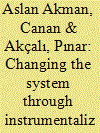

|
|
|
|
|
| Summary/Abstract |
Since the 1990s, debates on a constitutional system reform in Turkey have ignited controversies over the executive structure of its parliamentary system. This article looks at the debate in terms of the interaction between institutional dynamics and politicians’ choices, shaped by past institutional transformations following transitions. It is contended that institutional weaknesses underlying both the presidency and executive–legislative relations in Turkey have provided strong incentives for incumbent elites to challenge existing parliamentary norms and advocate presidential alternatives. Far from contributing to a sober diagnosis of the problems of parliamentarism, the recent constitutional amendment introducing a system of executive presidency has further divided Turkey’s already polarized political and civil society.
|
|
|
|
|
|
|
|
|
|
|
|
|
|
|
|
| 4 |
ID:
153651


|
|
|
|
|
| Summary/Abstract |
Cuba’s long military commitment to Angola resulted in two great victories that saved the country from catastrophic defeat and in the end initiated profound regional change. But long warfare also helped to entrench a heavy, elitist authoritarianism which served as a platform for deep presidentialist corruption. An ‘oiligarchy’ enjoys great wealth while simultaneously ignoring the basic needs of the people.
|
|
|
|
|
|
|
|
|
|
|
|
|
|
|
|
| 5 |
ID:
139016
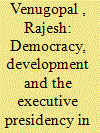

|
|
|
|
|
| Summary/Abstract |
This paper examines the developmental causes and consequences of the shift from a parliamentary to a semi-presidential system in Sri Lanka in 1978, examining its provenance, rationale and unfolding trajectory. Drawing on a wide range of sources, it sets out an argument that the executive presidency was born out of an elite impulse to create a more stable, centralised political structure to resist the welfarist electoral pressures that had taken hold in the post-independence period, and to pursue a market-driven model of economic growth. This strategy succeeded in its early years, 1978–93, when presidents retained legislative control, maintained a strong personal commitment to market reforms and cultivated alternative sources of legitimacy. In the absence of these factors, the presidency slipped into crisis from 1994–2004 as resistance to elite-led projects of state reform mounted and as the president lost control of the legislature. Between 2005–14, the presidency regained its power, but at the cost of abandoning its original rationale and function as a means to recalibrate the elite–mass power relationship to facilitate elite-led reform agendas.
|
|
|
|
|
|
|
|
|
|
|
|
|
|
|
|
| 6 |
ID:
072147
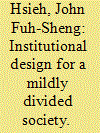

|
|
|
| 7 |
ID:
107320
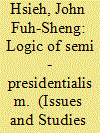

|
|
|
|
|
| Publication |
2011.
|
| Summary/Abstract |
Semi-presidentialism is a vague term which may refer to several different forms of government. This paper explores only one special type of semi-presidentialism, and shows that, even under similar institutional arrangements, actual practices may differ greatly. The two cases, France and Taiwan, share the basic features of such a system, though the French president has more powers than his counterpart in Taiwan. But interestingly, when the presidents party/coalition has been in the minority in parliament, the French president has frequently chosen to compromise and to cohabit ate with a prime minister supported by the parliamentary majority, while his counterpart in Taiwan has decided to confront the parliament by forming a minority government. As argued in the paper this can be accounted for by strategic behavior on the part of the president and the parliamentary majority in manipulating the loophole created by such a system. History and the nature of social cleavages have something to do with it as well.
|
|
|
|
|
|
|
|
|
|
|
|
|
|
|
|
| 8 |
ID:
158536
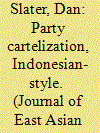

|
|
|
|
|
| Summary/Abstract |
Democracy and opposition are supposed to go hand in hand. Opposition did not emerge as automatically as expected after Indonesia democratized, however, because presidents shared power much more widely than expected. The result has been what I call party cartelization, Indonesian-style. This differs significantly from canonical cases of party cartelization in Europe. Yet it exhibits the same troubling outcome for democratic accountability: the stunted development of a clearly identifiable party opposition. Since the advent of direct presidential elections in 2004, Indonesian democratic competition has unsurprisingly assumed somewhat more of a government vs. opposition cast. But this shift has arisen more from contingent failures of elite bargaining than from any decisive change in the power-sharing game. So long as Indonesia's presidents consider it strategically advantageous to share power with any party that declares its support, opposition will remain difficult to identify and vulnerable to being extinguished entirely in the world's largest emerging democracy.
|
|
|
|
|
|
|
|
|
|
|
|
|
|
|
|
| 9 |
ID:
110023


|
|
|
|
|
| Publication |
2012.
|
| Summary/Abstract |
This article addresses the relationship between presidentialism and democracy by examining the role of parties in legislative bargaining in the 2000-2003 Russian Duma. Using a novel methodological approach, I empirically identify legislative voting coalitions to investigate whether the president's preference for party-based legislative bargaining prevailed. I find that in contrast to the 1996-1999 Duma, legislative voting coalitions closely followed party lines and that factions representing narrow interests were less relevant. The results demonstrate that presidential politics dominates electoral incentives in this political system and, more broadly, that political parties could be indispensable for regimes in transition to authoritarianism.
|
|
|
|
|
|
|
|
|
|
|
|
|
|
|
|
| 10 |
ID:
095001
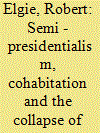

|
|
|
| 11 |
ID:
150547


|
|
|
|
|
| Summary/Abstract |
Semi-presidential systems develop under the following conditions: if the party system is weak, if the constitution inherits elements of the previous non-democratic system; if strong executive power is required. Weak party system and underdevelopment of political parties encourage personification of party leaders and the presidents, thus the president may place themselves above parties (like Boris Yeltsin did). Personalism becomes the reason for and the consequence of the weak party system, weak parliament and weak democracy.
|
|
|
|
|
|
|
|
|
|
|
|
|
|
|
|
| 12 |
ID:
155420
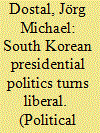

|
|
|
|
|
| Summary/Abstract |
The impeachment of President Park Gyeun-hye on 10 March 2017 saw South Korean politics enter a period of crisis. Her removal from office, the result of an unprecedented mass movement of citizen protests, provided a springboard for the subsequent success of the liberal candidate, Moon Jae-in, in the presidential election of 9 May 2017. This article suggests that political change in South Korea is only possible if actors move beyond the politics of personality, and tackle the structural reasons for the policy failures of recent times. Further, if democracy, a humane economic system and responsive political institutions are going to be developed and nourished, the country's ‘imperial presidency’ needs to be reformed. In particular, the current ‘winner-takes-all’ politics, with the presidency as the main locus of power, needs to be reformed in ways that promote a more balanced political system, increasing the influence of other actors and institutions.
|
|
|
|
|
|
|
|
|
|
|
|
|
|
|
|
| 13 |
ID:
146249


|
|
|
|
|
| Summary/Abstract |
This essay explores aspects of the relationship between political leadership and institutional power, comparing the different forms that presidential institutions have taken across the world and identifying the relationship between these structures and social, political, and economic outcomes. Semipresidential systems are distinguished from presidential systems, and within the former, a distinction is made between president-parliamentary and premier-presidential regimes. Some scholars have argued that presidential regimes are less conducive to the successful transition from authoritarian rule to democracy than are parliamentary governments, but the empirical evidence is contradictory. Recent research has, however, drawn attention to finer distinctions within the various broad categories of presidentialism, focusing on more precise institutional arrangements and trying to identify which are more, and which are less, consonant with the consolidation of democracy.
|
|
|
|
|
|
|
|
|
|
|
|
|
|
|
|
|
|
|
|
|